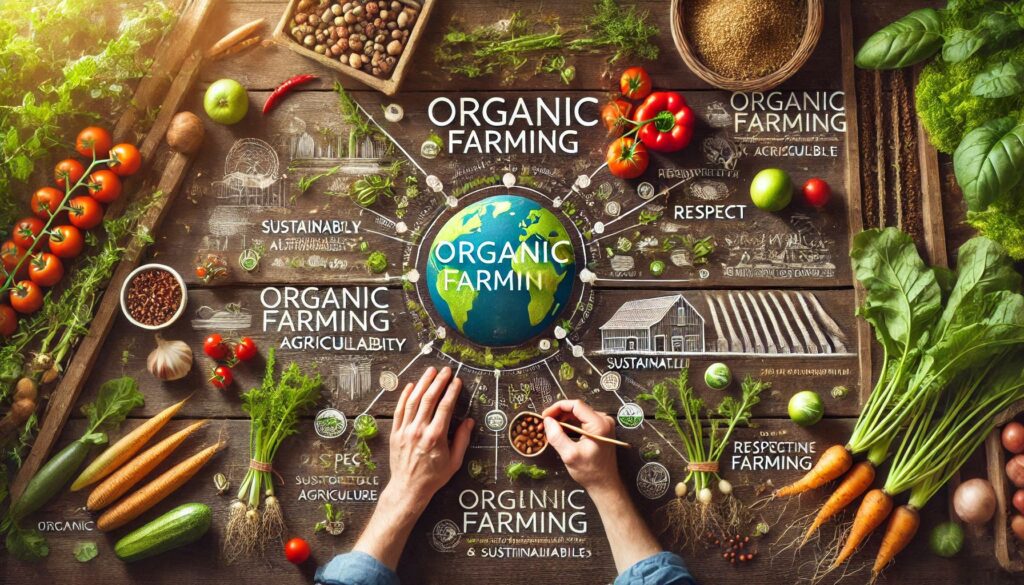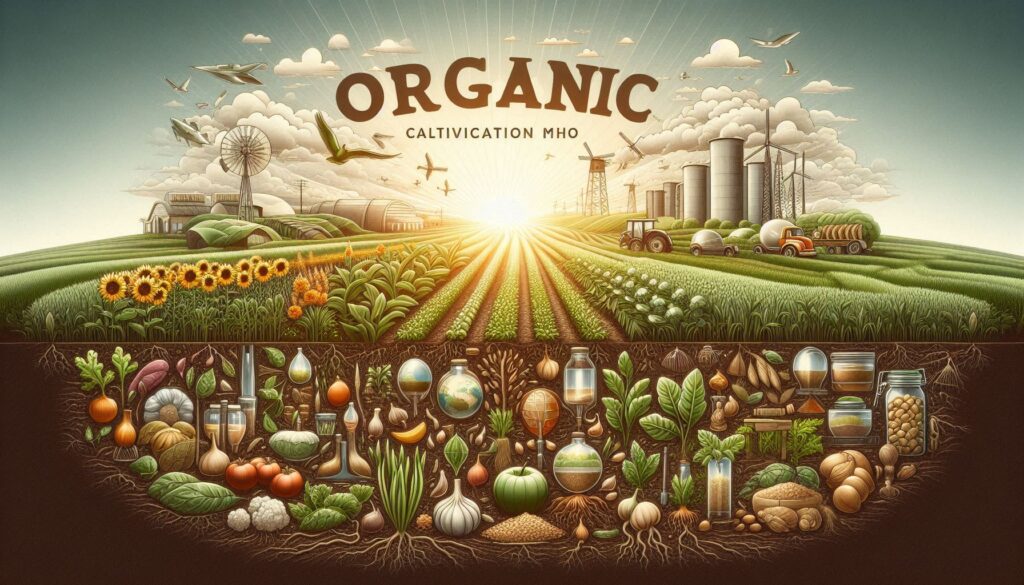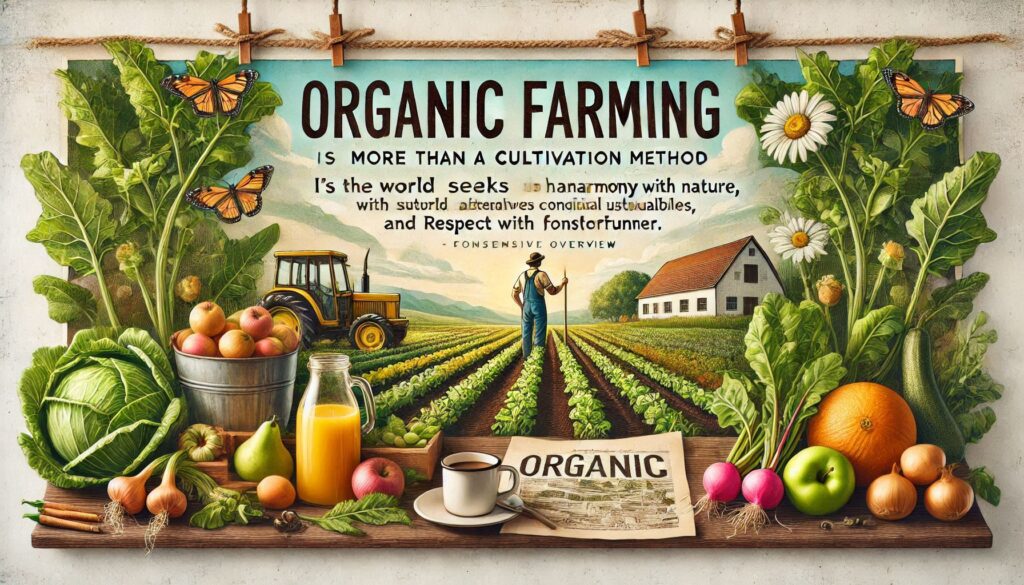Organic farming is more than a cultivation method; it’s a philosophy rooted in harmony with nature, sustainability, and respect for ecosystems. As the world increasingly seeks sustainable alternatives to conventional agriculture, organic farming has emerged as a frontrunner. This blog introduces the principles and practices that define organic farming, offering a comprehensive overview for those curious about this transformative approach.

The Essence of Organic Farming
Organic farming is a holistic agricultural system that avoids synthetic chemicals, genetically modified organisms (GMOs), and artificial additives. Instead, it relies on natural processes to promote soil health, biodiversity, and ecological balance. The goal is to produce food that is not only healthy for consumers but also environmentally friendly and sustainable.
Principles of Organic Farming
1. Health
Organic farming prioritizes the health of soil, plants, animals, and humans. By avoiding harmful chemicals, it ensures that food is free from toxic residues, enhancing overall well-being.
2. Ecology
Organic practices are designed to work in harmony with natural ecosystems. Techniques such as crop rotation, intercropping, and the use of natural pest control methods ensure ecological balance.
3. Fairness
Organic farming promotes fairness in its social and ecological relationships. It emphasizes ethical treatment of workers, respect for animal welfare, and equitable distribution of resources.
4. Care
The organic approach requires careful management of resources and environmental impact, ensuring long-term sustainability for future generations.
Core Practices of Organic Farming

1. Soil Management
Healthy soil is the foundation of organic farming. Farmers use compost, green manure, and crop residues to improve soil fertility and structure. Techniques like crop rotation and reduced tillage help prevent soil erosion and nutrient depletion.
- Key Practice: Adding organic matter such as compost and mulch to enrich the soil.
- Benefits: Improved water retention, reduced erosion, and increased microbial activity.
2. Crop Diversity
Monoculture (growing a single crop) can lead to pest outbreaks and soil degradation. Organic farming encourages crop diversity through intercropping and crop rotation, which improve soil health and disrupt pest cycles.
- Key Practice: Rotating nitrogen-fixing legumes with nutrient-demanding crops.
- Benefits: Enhanced biodiversity and reduced reliance on synthetic fertilizers.
3. Natural Pest Management
Instead of using chemical pesticides, organic farmers rely on biological control methods, such as introducing beneficial insects, using trap crops, and applying organic pest repellents like neem oil.
- Key Practice: Attracting natural predators like ladybugs to control aphid populations.
- Benefits: Reduced chemical exposure and safer ecosystems.
4. Organic Fertilization
Organic farming avoids synthetic fertilizers, focusing instead on natural sources of nutrients such as animal manure, compost, and plant-based fertilizers.
- Key Practice: Using compost tea or seaweed extract to boost plant nutrition.
- Benefits: Sustainable nutrient cycling and reduced environmental pollution.
5. Water Management
Efficient water use is critical in organic farming. Techniques like drip irrigation, rainwater harvesting, and mulching help conserve water and prevent wastage.
- Key Practice: Installing drip irrigation systems to deliver water directly to plant roots.
- Benefits: Improved water efficiency and healthier crops.
6. Livestock Integration
Organic farming integrates livestock into the ecosystem, ensuring ethical treatment and ecological benefits. Animals contribute manure for fertilization, help control weeds, and enhance biodiversity.
- Key Practice: Rotational grazing to prevent overgrazing and promote pasture health.
- Benefits: Improved soil fertility and animal welfare.
Benefits of Organic Farming
- Healthier Food: Organic produce is free from synthetic chemicals and GMOs, ensuring healthier food for consumers.
- Environmental Sustainability: By avoiding harmful chemicals, organic farming reduces soil and water pollution and promotes biodiversity.
- Resilient Ecosystems: Organic farms are better equipped to withstand pests, diseases, and climate change due to their diverse and balanced systems.
- Economic Opportunities: Organic products often command higher market prices, offering better economic returns for farmers.
- Community Impact: Organic farming supports local food systems and fosters community connections.

Challenges of Organic Farming
While organic farming offers numerous benefits, it also comes with challenges:
- Lower Yields: In the short term, organic farms may produce lower yields compared to conventional ones.
- Labor-Intensive: Organic farming requires more hands-on management and labor.
- Certification Costs: Obtaining organic certification can be expensive and time-consuming.
- Market Accessibility: Farmers may face difficulties accessing markets or competing with conventional produce.
The Future of Organic Farming
As consumer demand for sustainable and health-conscious food grows, organic farming continues to expand globally. Innovations in organic techniques, coupled with supportive policies, are paving the way for a brighter future. Farmers, consumers, and policymakers all play a role in advancing the organic movement.
Conclusion
Organic farming is a transformative approach that prioritizes health, ecology, fairness, and care. By embracing its principles and practices, farmers contribute to a sustainable food system that benefits the planet and its inhabitants. Whether you’re a seasoned grower or new to agriculture, organic farming offers a path to meaningful change—for your fields, your community, and the world.
most ask questions about organic farming
Here’s an overview addressing your questions about organic farming:
What is Organic Farming?
Organic farming is an agricultural method that emphasizes using natural processes and materials to cultivate crops and raise livestock. It avoids synthetic chemicals such as fertilizers, pesticides, and genetically modified organisms (GMOs), focusing instead on sustainable practices like composting, crop rotation, and biological pest control.
Benefits of Organic Farming
- Environmental Benefits:
- Reduces pollution and soil erosion.
- Enhances soil fertility and biodiversity.
- Promotes ecological balance.
- Health Benefits:
- Produces chemical-free and GMO-free food.
- Reduces exposure to harmful substances for farmers and consumers.
- Economic and Social Benefits:
- Creates employment opportunities.
- Supports small-scale farmers.
- Meets the growing demand for organic products.
Disadvantages of Organic Farming
- Lower Yields: Organic farming often produces less output compared to conventional methods, especially in the short term.
- Higher Costs: Organic certification, labor, and maintenance can be expensive.
- Market Challenges: Organic products may not always fetch higher prices, and there’s limited availability in some regions.
- Time-Intensive: It requires careful planning, monitoring, and time for soil recovery.
How is Organic Farming Useful?
- It improves long-term soil health.
- Provides nutrient-rich and safe food.
- Contributes to sustainable development and combats climate change by reducing greenhouse gas emissions.
Steps to Prepare for Organic Farming
- Soil Preparation: Conduct soil tests and enrich it using organic manure or compost.
- Crop Planning: Choose crops suited to the climate and soil conditions.
- Seed Selection: Use certified organic seeds or untreated, non-GMO seeds.
- Water Management: Ensure sustainable water use through drip irrigation or rainwater harvesting.
- Pest and Weed Control: Use natural pest repellents and manual weeding techniques.
Starting an Organic Farm Business in India
- Research and Education: Learn about organic farming practices, regulations, and market demands.
- Certification: Obtain certification through bodies like APEDA (Agricultural and Processed Food Products Export Development Authority).
- Land Preparation: Convert existing farmland or acquire organic-ready land.
- Investment Planning: Develop a budget for initial costs like seeds, tools, and certifications.
- Market Identification: Target urban markets, organic food stores, or export opportunities.
Why is Organic Farming So Popular?
- Rising awareness about health and environmental conservation.
- Increasing demand for pesticide-free and sustainably produced food.
- Government incentives and policies promoting organic farming.
Is Organic Farming Profitable?
Organic farming can be profitable due to high consumer demand and premium pricing for organic products. However, profitability depends on factors like scale, crop selection, and efficient marketing strategies.




Thanks for sharing. I read many of your blog posts, cool, your blog is very good.
I don’t think the title of your article matches the content lol. Just kidding, mainly because I had some doubts after reading the article.
Can you be more specific about the content of your article? After reading it, I still have some doubts. Hope you can help me.
I don’t think the title of your article matches the content lol. Just kidding, mainly because I had some doubts after reading the article. https://accounts.binance.com/it/register-person?ref=S5H7X3LP